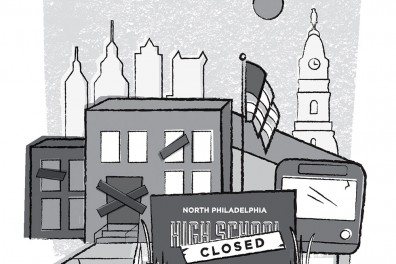
 Nonprofits in Philadelphia are exempt from property taxes for a reason.
Nonprofits in Philadelphia are exempt from property taxes for a reason.
With the Philadelphia public school system facing mass layoffs, multiple school closings and a $304 million deficit, there’s been an increasing outcry for the city to request that Philly’s larger nonprofits, namely universities like Temple, to begin chipping in their fair share of the municipal tax bill, in the form of voluntary Payments in Lieu of Taxes – PILOTs, for short – made to the municipal government.
At the moment, Pennsylvania’s nonprofits pay no property taxes. The city can only request, rather than require, that nonprofits make a PILOT, and has only done so sporadically since Ed Rendell’s tenure as mayor ended in 2000. The requested amount is typically a much smaller percentage of what the business would pay in for-profit real estate taxes.
Harvard University, for example, would have owed the city of Cambrige, Mass. About $40 million in real estate taxes in 2009. It merely sent along a $2 million PILOT, kept its nonprofit status, and moseyed on along, continuing to educate the world’s best and brightest.
Mayor Nutter’s administration has no current plans in place to request money from nonprofits. City Hall will, however, begin auditing nonprofits next year to ensure that each deserves its tax-exempt status.
“The level of city services that the universities receive have value, and they are not taxpayers,” Donna Cooper, former Secretary of Policy and Planning during Rendell’s time in office and current executive director of Public Citizens for Children and Youth, told the Inquirer on Sept. 26. “They should have to [make] PILOTs to compensate for costs that taxpayers subsidize for them.”
Technically speaking, this is a true statement. However, since the few universities that do pay PILOT fees in the US rarely pay more than $1-2 million per year, it would be nothing short of ludicrous to assume that Philadelphia can rely on collegiate PILOT fees alone to curb any type of budget shortfall. The city would, in essence, be attempting to siphon water out of the proverbial Titanic armed with nothing but a lunchbox.
According to a report compiled by The Chronicle of Philanthropy, tax-exempt real estate made up about a 10th of Philly’s land in 2006. Out of the 22 large U.S. cities referenced in the study, Philly had the highest percentage of nonprofit property within its borders. In a city with a largely poor and feeble tax base, tax exemptions at this level are a problem.
But these immunities pale in comparison to what the city is owed from negligent taxpayers.

According to a June 2013 study conducted by the Pew Charitable Trust, 18 percent of the city’s taxable land plots – nearly one out of every five properties – went unpaid in 2012.
The city is owed anywhere from $248 million to $515.4 million in neglected taxes and fees, depending on whether you ask Mayor Nutter himself or the Pew study, respectively. In 2011, Philadelphia was the fifth-most tax delinquent city out of the 30 most populous metropolitan areas in the U.S., behind Flint, Mich., Cleveland, Detroit, and St. Louis.
Rather than leaning heavily on the goodwill of universities, collecting delinquent property taxes should remain the city’s utmost priority. The Pew study claims that the city can realistically track down about $155 million in owed cash over the course of the next few years, which would effectively cut the public school deficit in half if applied directly to the shortage.
While a city-wide university PILOT payment system, much like the one currently in place in Boston, would help take a small fraction of the burden off of Philadelphia’s underprivileged taxpayers, it won’t matter if the city’s delinquent tax rate keeps increasing year to year.
According to the Daily News, at the height of Rendell’s PILOT collection, his administration pulled in about $9.4 million per year. From 2011 to 2012 alone, Philadelphia’s delinquent tax rate actually rose by $17 million, from $231 to $248 million, despite an increase in collection. Mayor Nutter’s administration would need to double Rendell’s best efforts for a PILOT collection program to merely keep up with the rate at which regular Philadelphians aren’t paying their taxes, let alone actually making a dent in any sort of deficit.
These figures come from an op-ed that Mayor Nutter himself wrote in the Inquirer in March during the paper’s multi-day series on the tax delinquency problem.
Moreover, Temple’s administration claims not to have the cash on hand to support the failings of the city and state governments.
“Would [paying a PILOT] lead to cuts?” Temple’s Interim Chief Financial Officer Ken Kaiser asked rhetorically in an interview with The Temple News. “Ultimately, it would have to, unless there was some new source of revenue to cover it.”
It seems painfully counterintuitive to cut education to fund education. If the aim of a PILOT program is to merely offset what it costs for Temple to utilize Philadelphia’s snow plows and dumpster collection services, perhaps a PILOT request holds weight. But who’s actually complaining about unfair service?
In reality, Philadelphians are scrambling to brainstorm new ways to fund a failing education system. Requesting money out of universities would merely be a temporary stopgap measure that solves absolutely zero about the city’s true funding problems in the long run.
Temple directly brings the city $21 million alone in wage taxes and is estimated to add roughly $3.7 billion in economic benefit the city of Philadelphia, Kaiser said. To somehow insinuate that it, or any of the other nonprofit universities in town, should disenfranchise students and faculty to help cover the estimated half billion in missing property taxes and fees accumulated through multiple administrations is downright rude. Philadelphia’s children deserve better than this.
The public schools are on fire. This city needs more than a garden hose to put them out.
Jerry Iannelli can be reached at jerryi@temple.edu or on Twitter @jerryiannelli..



Be the first to comment